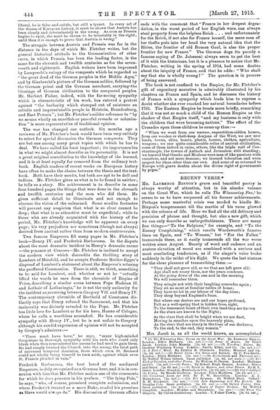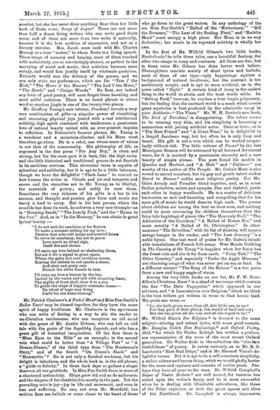RECENT VERSE*
Mn. /al/BENCE BINTOWS grave and beautiful poetry is always worthy of attention, but in his slender volume on the Great War, which he calls The Winnowing Each he seems to us to have surpassed all his former achievements. Perhaps some masterful crisis was needed to kindle Mr. Binyon's temperament till the marble of his verse glowed with the colours of life. Here we find all the old delicacy and precision of phrase and thought, but alco a new gift, whiels we can only describe as nnforgettableness. There are many fine things—" To the Belgians," for example, and " To the. Enemy Complaining,". which recalls Wordsworth's famous lines on Spain, and "To Women," but "For the Fallen" transcends these, as it easily transcends all the war verse written since August. Beauty of word and cadence and ars austere elevation of mood are combined with a curious and most comforting tenderness, as if the singer's voice broke suddenly in the midst of Ilia flight. We quote the last stanzas. for the sheer pleasure of transcribing them :- "They shall not grow old, as we that are left grow old
Age shall not weary them, nor the years condemn.
At the going down of the sun and in the morning Wo will remember them.
They mingle not with their laughing comrades again ; They sit no more at familiar tables of home;
They have no lot in our labour of the day-time;
They sleep beyond England's foam.
Bid sobers our desires are and our hopes profound,
Felt as a well-spring, that is hidden from sight,
To the innermost heart of their own land they are known
As the stars are known to the Night ; As the stars that shall bo bright when we are dust, Moving in marches upon the heavenly plain,
As the stars that are starry in the time of our darkness, To the end, to the end, they remain."
Mrs. Jacob is, as all time world knows, an accomplished'
• (1) The Wimumong Fan: Poems on the Great War. Dy Laurence Blue.. Loudon: Elkin Mathews. [Is. net.]—(2) Song. of Angus. By Violet: Jacob. London: John Murray. [22. ed. net.1--(3) Freedom Poems. By Geoffrey Winthrop Your's. London Smith, Elder, aud Co. [Se. net." i.5) 4 Peek o' Haut. By Patrick R. Chalmers. Dublin: Hommel and- Co. I.61. net.]—(5) Sutler guru: Sea Songs and BaLlods. By C. Fox-Smith. .oradon: Elkin Mathews. [Is. net.]—(G) Borderlands and Thorough ar.A. By Wilfrid Wilson Gibson. Same publisher, [hb. Gd, net each.]—(7) Th.. Bird of Paradise, and other Poems. lip William B. Davies. London Methuen and Co. [is. net.]—(8) Posy, By Hobert Hugh Benson. London Burns Gad Oates. [2s. GS. not]—(e) Hand In Hearne, and other Poems. By D. L. ales. London Si mpkin, Marshall, and Co. 04.1. net.] ---(10) Dm Country of the Young. By Maude Goldriug., Loudon: Elkin Mathews. 12s. 64. set.]-- III) Christmas Done for IOU. By F. W. lburdillon. London: A. I.. Humphrey.. [is. net.]---(12) Per Beeman. lip Wilfrid Blair. Oxford B. H. BLiek well. [Is. net.1---113) lime Beginningsand Ti, Record. By. Dough. Cole. Same publisher. its. ed. net.1-114) Oxford Poetry, MI, Same publisher. (In. nett--t1$) Sagas of Paster Br,inin. By Wiltridt Campbell. London Hodder and StoughInn.PM. ne1.1—G6, From Cho. Outposts. Dy Cullen Gould-lbw'. Loudon: T. Mims. Ustwan. [Ss. ed. net.]
novelist, but she has never done anything finer than her little book of Scots verse, Songs of Angus.' There are not more than half a dozen living writers who can write good Scots verse, and of these not more than two write it naturally, because it is the best medium of expression, and not as a literary exercise. Mrs. Jacob must rank with Mr. Charles Murray as a true " maker," to whom Scots is a living speech. These songs of memory and longing, most of them touched with melancholy, are so convincingly sincere, so perfect in the marrying of mood and music, that criticism becomes tam eulogy, and would fain justify itself by wholesale quotation. Extracts would mar the delicacy of the poems, and we can only state our preferences, which are for "Tam i the Kirk," "The Howe o' the Mearns," "The Lad i' the Mune," "The Gowk," and "Craigo Woods." No Scot, nor indeed any lover of good poetry, will soon forget these haunting and most artful cadences. There is no banal phrase or otiose word or careless jingle in one of the twenty-two pieces.
Mr. Geoffrey Young's new volume, Freedom,. reveals a very rare combination of gifts—a singular power of visualizing and recreating physical joys joined with a real intellectual subtlety, high spirit combined with tenderness, a passionate love of natural beauty united with an ever-present impulse to reflection. In Nietzsche's famous phrase, Mr. Young is a wanderer and a mountain-climber, and his Muse must therefore go alone. He is a zeal, one whose sense of values is not that of the commonalty. His philosophy of life, as expressed in the fine poem "For Any Boy," is clean and strong, but for the most part it is bare, like the high rocks and the little historical and traditional graces do not flourish in its earthless crevices. This elemental verse is capable of splendour and sublimity, but it is apt to be a little inhuman, though we have the delightful "Pinch Lane" to remind us how human the writer is. Clouds and air and tempests and snows and the eternities are to Mr. Young, as to Shelley, the materials of poetry ; and nobly be uses them. Sometimes the very richness of his gifts is a bar to his success, and thought and passion give form and music too heavy a load to carry. But in his beet poems, where the crucible has done its work, he achieves a very rare triumph—as in "Running Sands," "The Lonely Peak," and the "Hymn to the Sun." And, as in "In the Memory," he can attain to great lyrical beauty :— " I do not seek for sunshine or for flowers
To make a summer setting for my love; Passion that asks soft lamps and scented hours
To serve its constancy, has yet to prove
Love needs no ritual sign, Itself fire and shrine.
I'll servo my love behind no sheltering doors,
But sot it for a signal in great space, Where the gales riot over northern moors, Roaring the embers to red sparks a-chase, And sleet and gusty rain Drench the white brands in vain.
I'll raise my love a beacon by the bar, Lashed by the waves and salt with cleansing foam ;
The nights of frost shall clear it to a star
To guide the steps of happier comrades home:— Its wheel of hope may bring
Light for one home-conung."
Mr. Patrick Chalmers's A Peek o'fifaut' and Miss Fox-Smith's Sailor Town' may he classed together, for they have the same spirit of happy kindliness. Mr. Chalmers is the sportsman who can write of fishing in a way to stir the reader to nn-Christian restlessness, who can recapture an old mood with the grace of Mr. Austin Dobson, who can tell an odd tale with the gusto of the Ingoldsby Legends, end who has a great gift of historical imagination. Of the first there is "Mine Eyes to the Hills" as an example; in the second vein what could bo better than "A Village Poet" or "A Dream-Dinner," of the third type than "The Huntsman's Story," and of the fourth "On Simon's Stack" and "Mammotbe"f He is not only a finished workman, but his delight is infectious, and the whole book is, in the old phrase, a " guide to felicity." In these dark days so gallant a singer deserves all our gratitude. In Miss Fox-Smith there is more of a chastened melancholy. Ships grow old and so do aailormen, and the singers of her chanties live mostly in the past. Yet the prevailing note is joy—joy in life and movement, and even in lose and suffering. No one, not even Mr. Masefield, has written finer sea ballads or come closer to the heart of those who go down to the great waters. In any anthology of the sea Mies Fox-Smith's "Ballad of the 'Matterhorn,'" "Bill the Dreamer," "The Last of the Sealing Fleet," and "Rathlin Head" most occupy a high place. Her Muse is in no way derivative; her music in its wayward subtlety is wholly her own.
In the first of M7. Wilfrid Gibson's two little books, Borderlands,° he tells three tales, one a beautiful fantasy, the other two essays in irony and contrasts. All three are fine, but in these veins Mr. Gibson has done better work before. Thoroughfares consists mainly of short lyrics and ballade, most of them of one type—ugly happenings against a background of natural loveliness; but the contrast is too assiduously songht, and is apt to seem artificial, an in the poem called " Sight." A certain kind of irony is the easiest thing in the world to attain, and the least worth while. In "Solway Ford," however, be reaches a true tragic poignancy, but the feeling that the outward world is a mask which covers great mysteries is beet produced by the admirable essay in pure diablerie—. The Vixen." Mr. W. H. Davies's new book, The Bird of Paradise,[ is disappointing. His talent seems to be wearing very thin, and his eimplicity is becoming a mannerism with jarring artificial notes. Once or twice, as in "The Best Friend" and "A Great Time," he is delightful in a limpid Jacobean way, but too often he is only limp and banal. His gift is not a vein which can be worked unspar- ingly without risk. The little volume of Poems. by the late Monsignor Benson will be welcomed by all lovers of devotional verse, for it ie marked by a passionate sincerity and a rare beauty of simple phrase. The poet found his models in Quarles and Herbert, and "A Halt" and "Patience" are worthy of the author of The Temple. Mr. Gales's Muse is also vowed to sacred numbers, but its gay and gentle talent makes David in Heaven' unlike most religious poetry. For Mr. Gales Arcady and Paradise blend together, and, OA iu 80,110 Italian primitive, saints and nymphs, Pan and Gabriel, jostle each other in happy woodlands. He is a master of delicious harmonies, so new and haunting and compelling that for his mere gift of music he would deserve high rank. The poems about children are among the best we have seen, and nothing could be more entrancing for children themselves than the fairy-tale hagiology of pieces like "The Heavenly Nal," " The Adoration of the Grandees," " A Ballad of Easter Eve," and most notably "A Ballad of St. Christopher." In other manners " The R6veillon," with its list of dainties, will inspire savage hunger in the reader, and "The Last Journey" ie a noble hymn. One last word of praise for Mr. Gales'e inimit- able translations of French folk-songs. Miss Maude Goldring in The Country of the Young "is happiest when her fancy has the freest rein and she is far from earth. " Fairy Tale," " The Other Country," and especially "Under the Apple Blossom," are charming songs of what was never yet on sea or land. In a different manner "The Song of the Return" is a war poem from a new and happy angle of vision.
Among the very little books on our list, Mr. F. W. Boor. dillon's Christmas Roses• is a sheaf of war songs which contain the fine "The Debt Unpayable," which appeared in our columns, and "A Lamentation over Belgium," which we think is the best tribute yet written in verse to that heroic land. We quote one verse
"Lo, she bath given more than all, this little one, to mo
For they gave of their plenty, the wealth of land and sea ; But she has given all she was, and all she hoped to be !"
Mr. Wilfrid Blair's For Belgium• is devoted to the same subject—stirring and robust lyrics, with some good sonnets. Mr. Douglas Cole's New Beginnings,• and Oxford Poetry, 1914," for which Sir Walter Raleigh has written a preface, are representative of the verso of the most recent Oxford generation. Sir Walter finds in the collection the " abet:lute truthfulness" of poetry. It exists certainly, as in Mr. R. S. Lambert's "East-End Dirge," and in Mr. Sherard Vines's de- lightful verses. Bet it is apt to be a self-conscious simplicity, a rather solemn and barren thing, which we would gladly barter for the roses and raptures and conceits of earlier years. Per- haps they have all gone to the wars. Dr. Wilfrid Campbell's Sagas of Vaster Britain" are well named, for vastness has seized upon the writer's fancy, and he is most successful when he is dealing with illimitable adventures, like those of the Polar explorent, or with the great spaces and skies of the Northland. Dr. Campbell is always impressive. bat be is not always very poetic, and falls sometimes into a sort of exalted measured prose. When he is inspired not by literary convention, but by a strong personal passion, as in "Scotland," he can write moving poetry, and "How One Winter Came in the Lake Region" is finely observed and full of natural magi°. Mr. Cullen Gouldsbury's collections of his verses are always welcome, and the last, From the Outposts," is as good as its predecessors. No one else has quite Mr. Gouldsbury's experience and gifts. He can see the drama in what is usually rendered as melodrama, and he is intensely conscious of the romance of frontier- making when the enemies are not savage tribes but Nature, ennui, and a man's self. Excellent in his ordinary vein are "The Caravan," "His Laat Will and Testament," "Graves of the North." and " The Lament of Abdullah-Bin-Suliman " —as good modern ballads as you will find in a day's journey. But those who would appreciate Mr. Gouldsbury's real power of seizing the heart of a situation and reproducing it with a sharp faithfulness should tern to "The Price of Empire"— to our mind the most memorable thing he has written.








































 Previous page
Previous page